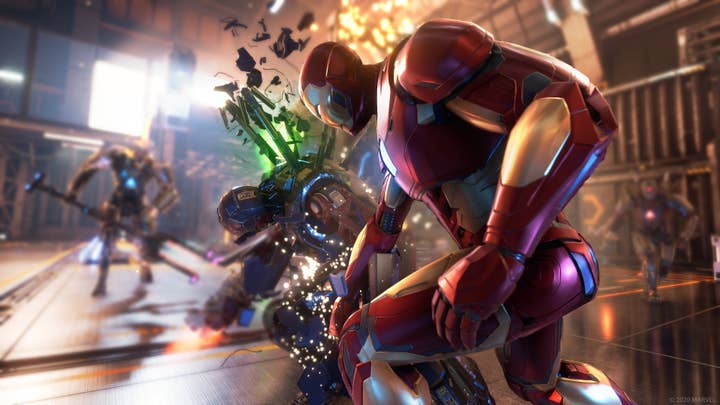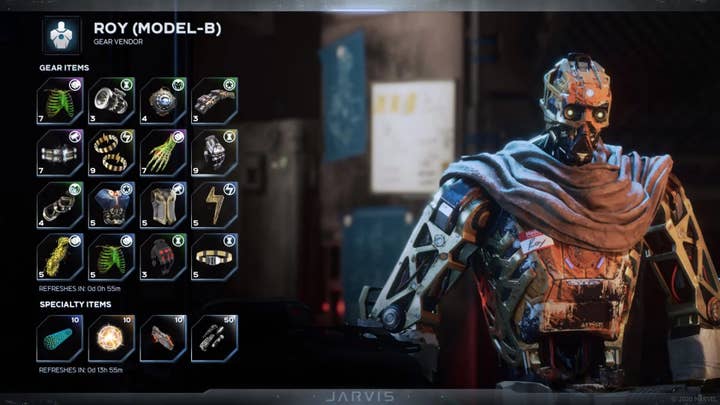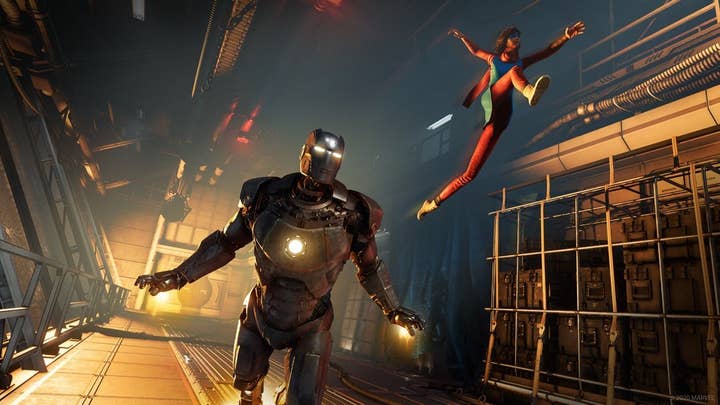Marvel's Avengers | Critical Consensus
The critics found much to like in Crystal Dynamics' campaign, and rather less in Square Enix's ambitions to make its own Destiny
If anyone from Square Enix happens to read this article, they may take some comfort from this fact: when Destiny launched in 2014, plenty of people felt underwhelmed.
Looking back at those reviews now, it's clear that critics struggled to take the measure of a Bungie game that was unrefined, unfocused, lacking in content, and lots of other things that simply weren't true of Halo. It's also clear that the reviews captured a moment in time for an experience designed to grow and change. Destiny was not a finished product at launch; indeed, it had potential that arguably took a full sequel to truly fulfill.
This is relevant because Destiny's Metacritic average is around 75 after more than 90 critics had their say. At the time of writing, Marvel's Avengers is sitting only a couple of points below that after several dozen reviews, and if there's one observation that virtually every single one makes, it's that Crystal Dynamics' new game was made with Destiny firmly in mind.
"When it goes in its own direction -- which mostly happens with Ms. Marvel -- the campaign really shines"
The Verge
The degree to which that was Crystal Dynamics' choice is hotly debated. Ever since a handful of divisive beta weekends in August, the notion that publisher Square Enix is the true reason for the looty-shooty leanings of Marvel's Avengers has been widely accepted as gospel. Such things are difficult to prove, of course, but it's equally difficult to grasp why the world's most popular character-action IP was handed to a studio that made nothing but character-action games for a decade, and we end up with a live-service title in the lineage of Destiny.
There were fat, greasy stacks of dollars on the table, the prevailing narrative goes, and Square Enix felt that getting enough of it demanded a game that could be monetised for the next ten years. This is all the more plausible when one considers that the plan for Marvel's Avengers was likely set in early 2017 -- a full 18 months before Insomniac's Spider-Man started its run towards 14 million sales, despite being on a single platform and nothing at all like an MMO. If the plan for Marvel's Avengers were laid out in early 2019, the resulting game may have been very different.

At the very least, the aspect of Marvel's Avengers that is drawing all the praise may have been a more substantial part of the overall package. In his last article, contributing editor Rob Fahey explored the apparent disconnect between the loot-shooter that people encountered in the beta and the campaign mode being discussed on social media -- and that same divide is at the centre of the game's reviews, both positive and negative.
"It's a game where you can play as your favorite comic book hero, team up with friends for various missions, and uncover lots and lots of loot. You gain new powers and outfits and just generally keep grinding away," said The Verge's Andrew Webster. "I've been playing the game for the past week and have hardly experienced any of that -- instead, I've been focused entirely on the single-player campaign, which is surprisingly great."
"There are over 100 abilities for each character. It's a rewarding system that will keep you playing for a long time"
Game Informer
The key to its appeal for Webster -- as it is for the majority of critics -- is Kamala Khan, a relatively obscure protagonist at the heart of a story populated by some of the most famous figures in all of popular culture. Khan starts out as a fan attending an event for the Avengers, who develops powers of her own and becomes part of the team.
"Her enthusiasm and warmth are what tie an otherwise bland story together," Webster said. "She's the one who starts bringing the Avengers back together, and she's the one who keeps them intact even amidst their persistent squabbling.
"The structure also leads to a satisfying sense of progression, as your superhero team and base steadily grow and improve over time, thanks largely to her efforts. The places where it stumbles are when the game tries too hard to mimic the feel of the movies. But when it goes in its own direction -- which mostly happens with Ms. Marvel -- the campaign really shines."
Polygon's Laura Dale found Kamala Khan similarly endearing, and noted how refreshing it was to see a central character in a AAA game from such a specific background: "a Pakistani-American Muslim, with a dorky, overprotective father and her own culturally relevant perspective on moral duty."
The pivot towards the Destiny-esque long-term vision for Marvel's Avengers happens when the campaign mode ends, Dale said, noting that the story mode is "a much larger part of the overall experience" than players might expect.
"The game's latter, live-service portions do show promise, but the road between the two halves is currently very rocky"
Polygon
"The game's latter, live-service portions do show promise, but the road between the game's two halves is currently very rocky," Dale continued. "Players are given two choices on the game's main menu: campaign and Avengers Initiative. The Avengers Initiative option allows players to skip the game's plot missions entirely and jump straight to the multiplayer, loot-grinding content. The game warns against doing this, however, and I agree."
At its very best, Dale added, Marvel's Avengers is reminiscent of Dynasty Warriors, in the way it grants the player supreme power and waves of much weaker enemies to smash to pieces. The way Crystal Dynamics delivers on that promise of superheroism is the root of Game Informer's admiration for the experience, clearly evident in Andrew Reiner's 87.5 out of 100 review. Each of the Avengers has a "mini-arc" to resolve, and each feels satisfyingly distinct from the others.
"The Hulk is the unstoppable monstrosity you'd hope, smashing enemies and environments to bits. Thor's Mjölnir absolutely wallops enemies, and each swing feels like it is delivered by a god. I also enjoyed the shield antics of Captain America... and the acrobatics of Black Widow. All of these heroes have great cinematic moments backed by huge gameplay setpieces."

Reiner added: "Every encounter and success feeds into an experience point system that allows you to level up and earn new abilities. Avengers offers a surprising amount of depth in this field. You can't really spec out a hero differently than their base potential, but you can add extra moves to combos, speed up cooldowns on ranged attacks, and make each character more lethal in certain ways. There are over 100 abilities for each character. It's a rewarding system that will keep you playing for a long time."
The ability to mould a hero character to your specific taste and style of play is the bedrock of Square Enix's ambition for Marvel's Avengers to become a live-service product that keeps going (and keeps earning) for years. However, it is also the bedrock for numerous systems designed specifically to achieve that goal, which many critics regard as an ill fit for the IP.
"In the end, it feels like more care has gone into the game's economy than its experience"
VGC
Nobody puts that dissatisfaction in stronger terms than The AV Club's William Hughes, who describes the game as "a matryoshka of shitty game design ideas."
"Ostensibly a role-playing game... Avengers takes the very off-theme step of linking its heroes' power directly to their equipment. In practice, that means that, if you don't want to see Captain America get his teeth kicked in by low-level... goons on the regular, you're going to need to constantly scour the game's semi-open-world levels for chests full of loot, seeking out incremental power boosts and comparing tiny shifts in numbers in search of a necessary edge."
Hughes adds: "While there's a glimmer of a good idea here -- in so far as it allows for the possibility of customizing different heroes toward specific builds -- in practice, you mostly just pick the stuff with the biggest number, then sink one of your nine (!) crafting currencies into the item to make the number go even higher."
The AV Club was far more complementary about the story and the character of Kamala Khan, but there is an abiding sense that Marvel's Avengers' live-service ambitions ultimately weaken even that part of the game. This idea is more fully developed in Jon Bailes' two-star review for Video Games Chronicle, which suggests that -- at its core -- this is "a game about opening boxes."
"This Game as a Service structure looms over the campaign, detracting from the superhero experience and forcing the story to fit around its needs," Bailes wrote. "You soon create a base on the Helicarrier, which quickly fills with vendors and factions offering optional team missions and daily challenges
"The grind of excavating and investing endless stuff begins. If you don't collect the trinkets, your power level won't increase, slowing your post-campaign progress... In the end, it feels like more care has gone into the game's economy than its experience.
"For its aimless loop, Avengers is willing to sacrifice refined combat systems, interesting characters, or smart mission and enemy design... If Avengers is ever going to provide anything as complex as Destiny's Raids, there's a ton of work to do, and no indication that anyone intends to do it."

